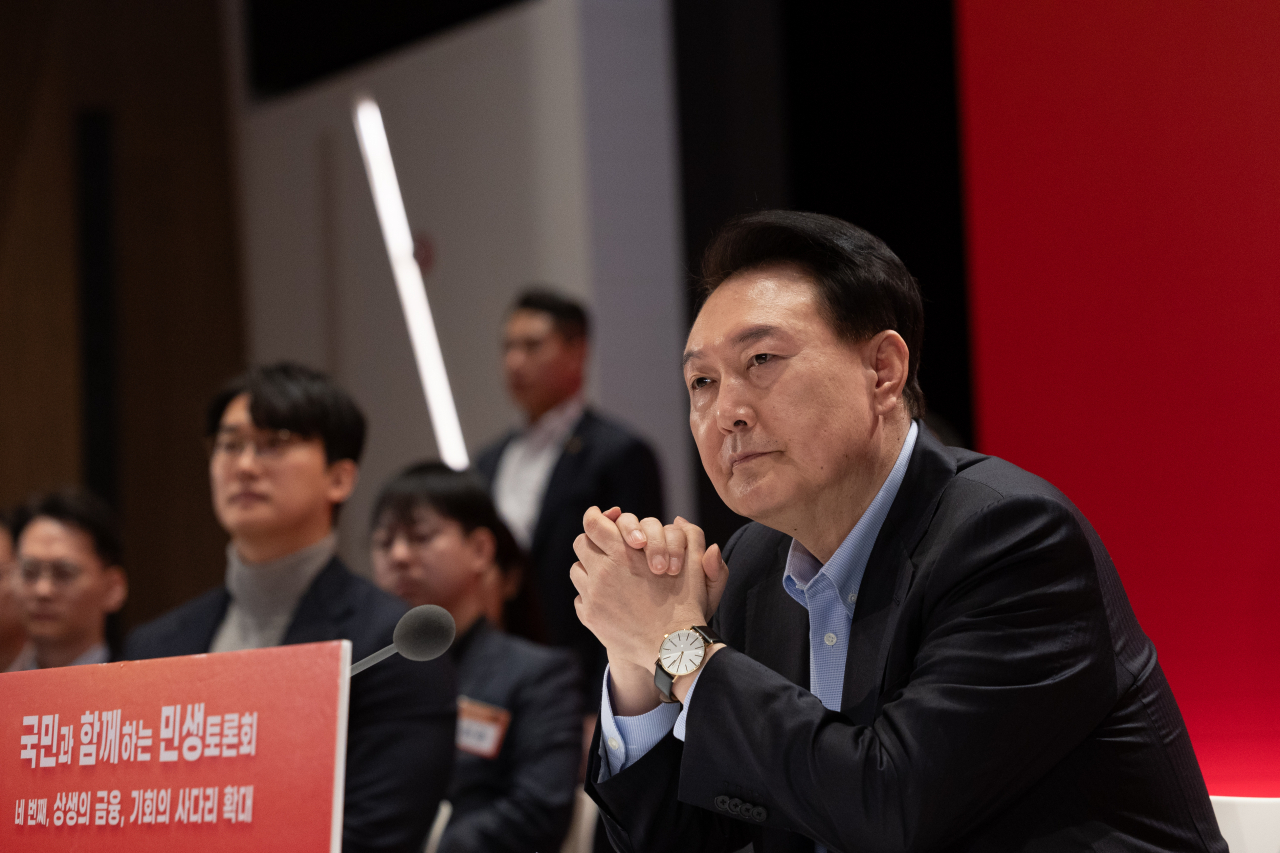 |
President Yoon Suk Yeol (right) attends a public debate touching upon the matter of the people's livelihoods, which marked the fourth of its kinda, at the Korea Exchange office in Seoul on Wednesday. (Yonhap) |
President Yoon Suk Yeol on Wednesday said the excessive taxation on corporations trading on the stock market here could be outdated, hinting at easing the tax burden.
Yoon claimed that easing tax burden on corporations was a prerequisite to boosting stock market value. More than a quarter of Korea's 50 million population trade shares -- more than double compared to five years before.
"We need to find a new angle at which the inheritance tax and other types of extra taxes (on corporations) are perceived," Yoon told some 90 participants -- including 50 ordinary people -- in the fourth round of the public debate over policy direction, held at the Korea Exchange in Seoul. "We need a new consensus that the excessive taxation (on companies) will be detrimental to the stock market, and to the livelihoods of the middle-class and ordinary citizens."
South Korea has a top inheritance tax rate of 50 percent, the world's second-highest after Japan, if the inherited asset's value exceeds 3 billion won ($2.2 million). This rises to 60 percent for those inheriting shares in major companies.
"What if the major shareholder of a company is looking to pass on their business to their family, and the share price of the company goes up sharply? The shareholder will be charged gigantic amount of inheritance taxes and many other different types of taxes, making the business succession impossible to afford," Yoon said.
"Then, the family-run business must find its new shareholder, and the employees there will find their work situation unstable."
Yoon, however, did not elaborate on the plan to ease tax burdens on the corporations Wednesday.
Meanwhile, Yoon blasted South Korean banking institutions for their lack of competition, contributing to excessive profits, saying there is room for the conservative government to intervene to establish banking fairness here.
The Yoon administration is looking to help banking consumers relieve their borrowing costs burden, which translates into banks' key source of revenue, especially with the current monetary tightening policy in place.
"There have been criticisms over the banking institutions' profit parade with minimal effort, riding on the global interest rate hike trend," Yoon said. "These criticisms cannot be taken lightly from the ordinary people's perspective."
The FSS' latest estimate indicated that South Korean domestic banks -- including Shinhan, KB Kookmin, Hana and Woori -- raked in 44.2 trillion won ($32.8 billion) of interest revenue from January to September last year, a record-high figure up 9 percent from the previous year. The banks' net interest margin increased 4 percent to 1.66 trillion won.
This resulted in a November comment by Lee Bok-hyun, the former prosecutor who became governor of the banking watchdog, the Financial Supervisory Service. Lee then said the rise of banks' interest income "translates into ordinary people's burden."
Lee estimated the banks' annual interest income here to reach 60 trillion won, while the banking industry lacks innovation.
"The cause of the excessive profit of financial institutions stems from a lack of competition while surrounded by an entry barrier that is hard to overcome," Yoon said Wednesday. "In the meantime, consumers are finding themselves less able to access loans and financial information."
On Wednesday, the Financial Services Commission, a banking regulator, proposed ways to help 1.87 million people reduce their borrowing costs by 1.6 trillion won over the next two months.
The government also plans to give Koreans who borrowed a combined 1,008 trillion won in housing loans, including mortgage and jeonse loans, access to a system to refinance their loans via mobile apps, potentially under new terms with lower interest rates, in January.
The system has been in place for consumers who took out personal loans based on their credit score since May last year. Comparing loan products in real time, some 110,000 users of the system have been able to reduce the interest rate of their products by 1.6 percentage points on average, according to FSC's estimate.
This initiative is in line with the recent decision Monday to erase late payment records -- lasting up to five years -- of some 2.9 million people, including consumers and small business owners, which would have otherwise made it harder for them to obtain new loans or credit. Those delinquent on loans less than 20 million won from September 2021 until end-January will have their record of delinquency removed if they repay before May.
"The financial institutions are becoming more and more enormous, and their industry's oligopoly is inevitable," Yoon said. "In this vein, the government has an obligation to create grounds for fair competition to tackle the side effects of oligopoly."







![[Today’s K-pop] Blackpink’s Jennie, Lisa invited to Coachella as solo acts](http://res.heraldm.com/phpwas/restmb_idxmake.php?idx=644&simg=/content/image/2024/11/21/20241121050099_0.jpg)